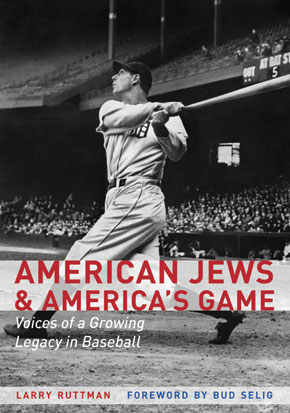American Jews and America’s Game
Voices of a Growing Legacy in Baseball
A Review by Marvin A. Cohen
Originally published by the Jewish Federation of Broome County, New York in The Reporter, Issue 19, May 10, 2013. Reprinted by permission of The Reporter Group, Vestal, New York.
 American Jews and America's Game is a book about baseball in the same sense that Tolstoy’s masterpiece, War and Peace, is about Napoleon’s invasion of Russia. You can learn a lot about that historic military conflict by reading Tolstoy’s account, but that is not what the book is about. Its real subject concerns the hopes, dreams and daily lives of the people, great and small, who lived through that epoch. It is a book about the human condition and that is very much the reason that it has become a classic.
American Jews and America's Game is a book about baseball in the same sense that Tolstoy’s masterpiece, War and Peace, is about Napoleon’s invasion of Russia. You can learn a lot about that historic military conflict by reading Tolstoy’s account, but that is not what the book is about. Its real subject concerns the hopes, dreams and daily lives of the people, great and small, who lived through that epoch. It is a book about the human condition and that is very much the reason that it has become a classic.
Larry Ruttman takes a similar approach in American Jews & America’s Game. Like Tolstoy, he tries to encompass a huge topic—in this case, baseball’s memories, plus its life lessons and their meaning for us all—by bringing us stories from many perspectives. We hear from players, owners, politicians, the commissioner of baseball and occasionally, just plain fans.
Throughout War and Peace, the presence of Napoleon looms in the background. In Ruttman’s book, the theme of Judaism and its influence on the contributor’s lives and accomplishments reverberates throughout.
The book features a prestigious cast. We have a foreword from the Commissioner of Baseball, Bud Selig, and a preface from Martin Abramowitz, the originator of Jewish Major Leaguers baseball cards. There are also recollections from such luminaries as Alan Dershowitz and Barney Frank. In these pages, we can go from Murray Chass, the Hall of Fame columnist for The New York Times, to Marvin Goldklang, an owner of minor league teams. There is Theo Epstein, the youngest general manager in Major League history when he was with the Boston Red Sox, describing his rise to the top of a game that he loves, while Bud Selig does the same.
All in all, Ruttman has assembled 43 stories, divided neatly into decades from the 1930s through the 2010s. Also included are 76 excellent illustrations from many sources, often provided by the subjects themselves.
What are we to make of this collection? In his foreword, Selig comments that: “This is a book that celebrates family…baseball’s, yours and mine.” He recalls how baseball provided a way for his parents to bond with their sons and to appreciate the way that Selig’s passion for the game helped to create friendships for him in the neighborhood. In other words, the lesson here was that baseball can be an instrument of acceptance for the children of immigrants. The stage has now been set for a life lesson to appear in every section.
In his preface, Ruttman expresses his profound appreciation and wonder at the way that the book came to fruition. Although he credits Providence, it seems that in the adult education course that he was taught on the art of the interview, his students encouraged him to write a book using those techniques. After much soul-searching, Providence again came to the rescue with the idea of writing about “the impact of Jews on the history of baseball.”
He knew that there were many books available about Jewish baseball players, but he found them superficial: “They did not probe into the person’s roots and psyche.” His ability to do that as an interviewer gave him the confidence to go ahead. Fifty interviews—some three hours long—and travel from Israel to wherever he could find an interviewee led to this book.
One can only be amazed at a man in his 70s having the energy to do the research that was required. Many people helped him and he graciously thanks them in the book, but the effort was primarily his.
Readers will find their own favorites, as I did, and their own emotions and memories will surely resonate with one or more of the book’s sections. You don’t have to be Jewish to enjoy this book, but it helps. Ruttman is no Tolstoy, but he has produced something of value from which many in this hedonistic and culturally confused society can surely benefit.
Marvin Cohen is the author of seven books. His most recent were Baseball in Broome County and Hockey in Broome County for Arcadia Publishing. He was a featured author at the Baseball Hall of Fame in Cooperstown, NY for his book The Dodgers-Giants Rivalry: 1900-1957.
